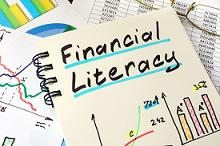Financial Literacy
April has been designated by Congress as National Financial Literacy Month. In honor of this initiative, below please find links to several excellent free resources for acquiring good financial habits.
1. National Financial Literacy Month: A wealth of materials is available through the National Financial Literacy Month Home Page. The home page includes a link to 30 steps to financial wellness. The steps include such things as a selfassessment quiz, suggestions for clearing out financial clutter, correcting credit reports, planning savings accounts, and creating a spending plan. In addition, the home page includes a link to Tools for Success, which then links to different resources, such as different worksheets and an eBook titled “Tips for Change.” http://www.financialliteracymonth.com/
2. US Courts Financial Literacy Financial Firsts Can Be Financial Pitfalls -- Financial firsts in the lives of young people can become financial pitfalls. Four, realistic scenarios set the stage for discussions of the life skills needed to navigate personal finances successfully. The scenarios in this activity are a springboard for discussing four financial milestones that can be fraught with risks for young people as they get established in life. This age group is coming into many financial firsts – first vehicle, first credit card, first student loan, and first job and apartment. http://www.uscourts.gov/educational-resources/educational-activities/financial-literacy-financial-firsts-can-be-financial
3. United States' Financial Literacy Site: MyMoney.gov is the United States government's website dedicated to teaching all Americans the basics about financial education. The site revolves around five financial principles: “Making the most of your money starts with five building blocks for managing and growing your money —The MyMoney Five.” Dive in to see what they are. The site includes a collection of resources for all kinds of people — kids, teachers, parents, caregivers, the military, women, retirees, and employers. http://www.mymoney.gov/Pages/default.aspx
4. C.A.R.E. — “It’s a matter of life or debt.”: Credit Abuse Resistance Education — C.A.R.E. — is the brainchild of a now retired bankruptcy judge in New York. This financial literacy outreach program has grown to almost all 50 states. The site has links to pages for students, parents, educators, and professionals: The information available on each page includes handouts, articles, and videos on topics such as budgeting, credit card information, buying a car, minimizing debt, and predatory lending. The site includes a couple Spanish language handouts. http://care4yourfuture.org/
5. FoolProof®: Billed as C.A.R.E. ‘s financial literacy partner and endorsed by the National Association of Consumer Advocates, FoolProof® provides online modules and videos (over 100) for all age groups: middle and high school students, parents, college-age students, young adults, and adults. http://www.foolproofme.com/
6. The Road to Financial Independence - a video presentation by Hon. Margaret M. Mann, Chief Judge of the California Southern Bankruptcy Court (CASB).
7. Get Rich Slowly - Personal Finance That Makes Cents - Get Rich Slowly is a site that features articles about basic financial skills, such as budgeting, handling bank accounts, credit and credit cards, and investing. http://www.getrichslowly.org/blog/ The site includes a page that has an interactive tool to weigh job prospects and the cost of education. Go here: http://www.getrichslowly.org/blog/category/career-education/
8. Money Smart - A Financial Education Program. The FDIC's Money Smart program is a comprehensive financial education curriculum designed to help low- and moderate-income individuals outside the financial mainstream enhance their financial skills and create positive banking relationships. Money Smart has reached over 3 million consumers since 2001. Research shows that the curriculum can positively influence how consumers manage their finances, and these changes are sustainable in the months after the training.
Financial education fosters financial stability for individuals, families, and entire communities. The more people know about credit and banking services, the more likely they are to increase savings, buy homes, and improve their financial health and well-being.
The Money Smart curriculum for consumers is available free of charge in several versions. And, the FDIC in collaboration with SBA, offers the Money Smart for Small Business instructor-led curriculum focusing on the needs of new or existing entrepreneurs.


